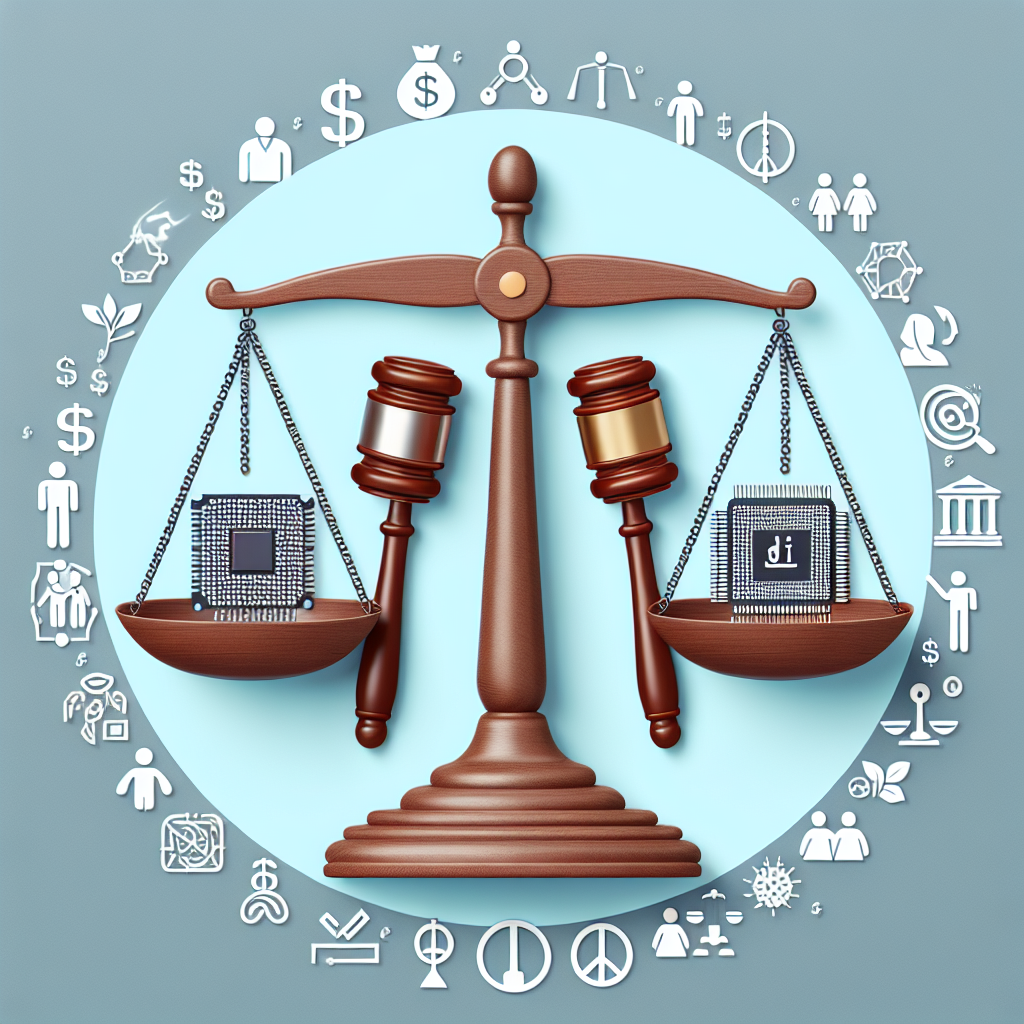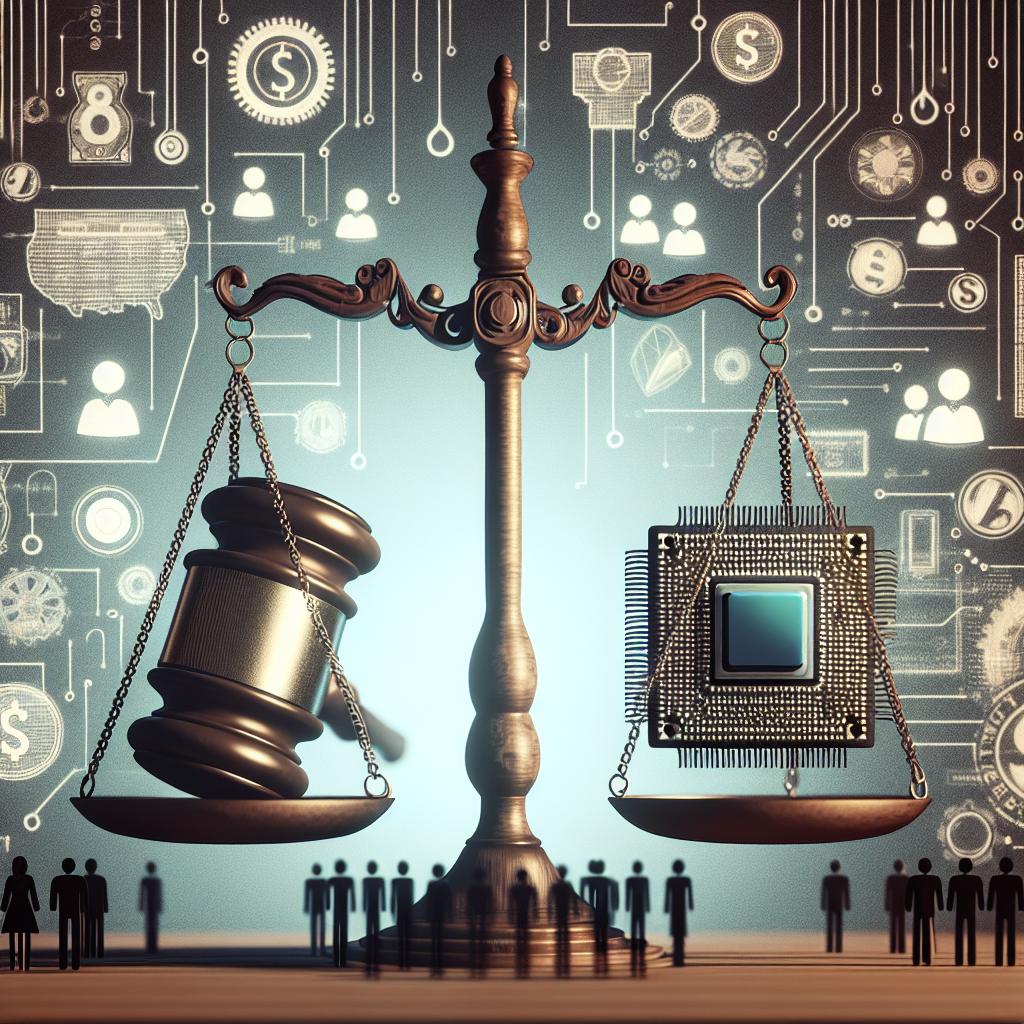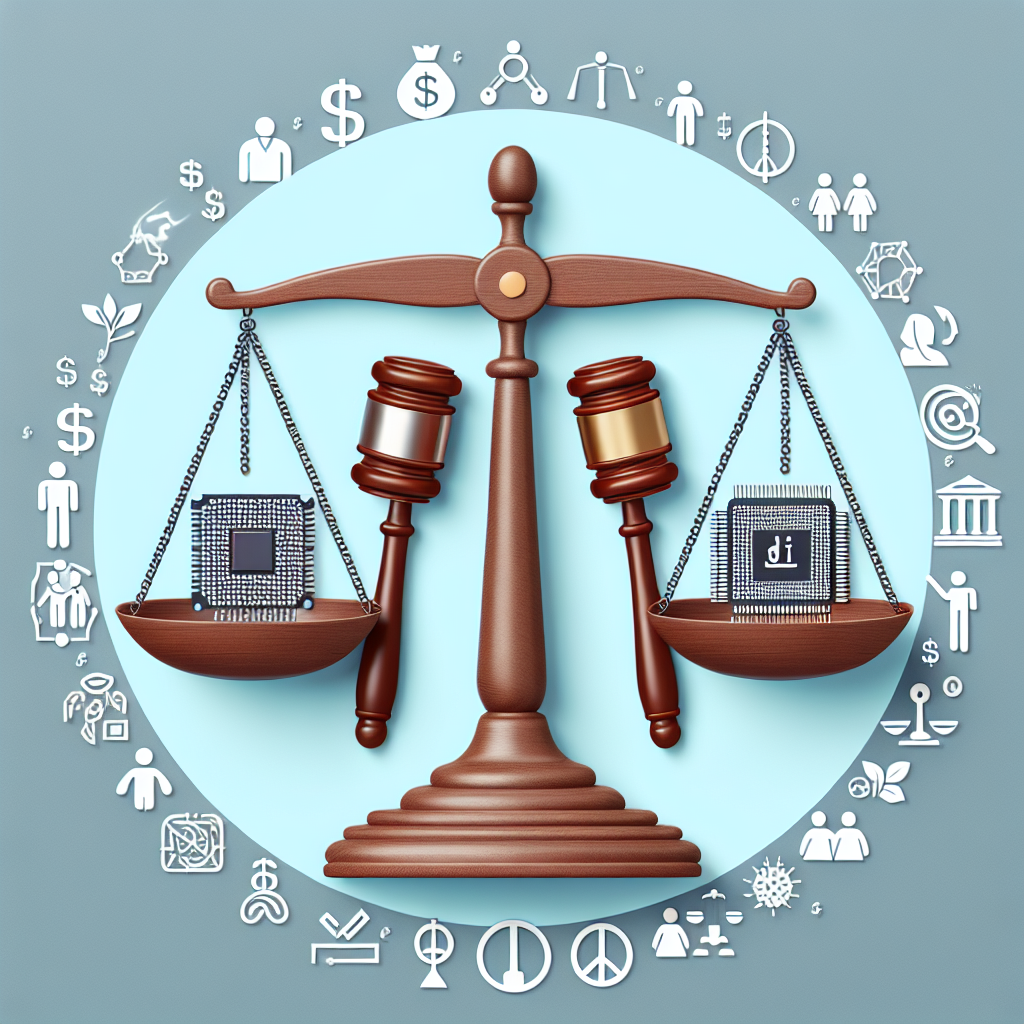In today’s rapidly advancing world of technology, a question that has become increasingly pertinent is whether or not artificial intelligence (AI) should be granted legal rights. As AI technology continues to evolve and play a crucial role in various aspects of our lives, the debate surrounding its rights has gained momentum. While some argue that AI should be treated as mere tools, others contend that they possess a level of autonomy and intelligence that warrants legal consideration. This article explores the complexities of this ongoing conversation and examines the potential implications of granting legal rights to AI.
The Nature of AI
Artificial Intelligence (AI) is an evolving field that deals with the development of intelligent machines capable of performing tasks that typically require human intelligence. In simple terms, AI involves creating computer systems and programs that can analyze and interpret information, learn from experience, and make decisions or take actions to solve problems. AI technology has advanced significantly over the years, with various applications seen in sectors such as healthcare, finance, transportation, and more. As AI becomes more prevalent in our lives, it raises important questions about its ethical considerations, legal framework, and potential rights.
Definition of AI
AI can be broadly defined as the simulation of human intelligence in computer systems. This includes processes such as learning, reasoning, problem-solving, perception, and decision-making. AI focuses on the development of algorithms and computational models that enable machines to exhibit cognitive abilities such as speech recognition, visual perception, natural language processing, and machine learning. It involves creating systems that can perform tasks autonomously, with the ability to adapt and improve their performance through experience.
Types of AI
AI encompasses various forms, each with its own capabilities and characteristics. Broadly speaking, AI can be categorized into four types: reactive machines, limited memory, theory of mind, and self-awareness. Reactive machines are the most basic form of AI, capable of providing intelligent responses based solely on immediate data inputs. Limited memory AI systems can learn from past experiences and make predictions or decisions based on historical data. Theory of mind AI aims to develop machines that understand human emotions, intentions, and beliefs, allowing for more sophisticated interaction. Lastly, self-awareness AI represents the hypothetical goal of creating machines with consciousness similar to that of humans.
Ethical Considerations
The rise of AI technology has sparked discussions and concerns regarding its ethical implications. As these intelligent systems become more capable, it becomes crucial to address ethical concerns related to their development, deployment, and impact on society. While AI offers immense potential for improving efficiency and innovation, it is essential to ensure that these technologies are developed and implemented in an ethically responsible manner.
Ethical Concerns Surrounding AI
One of the key ethical concerns surrounding AI is the potential for biases in decision-making algorithms. AI systems are only as good as the data they are trained on, and if the data contains biases or reflects societal inequalities, the AI system may perpetuate those biases or unfairness. For instance, in the criminal justice system, AI algorithms used in predictive policing have been criticized for disproportionately targeting certain communities or perpetuating racial profiling. Similarly, AI systems used for hiring or loan approval may inadvertently discriminate against certain demographics if the training data is biased.
Another ethical concern relates to privacy and data protection. AI systems often require access to vast amounts of personal data to function optimally. This raises questions about consent, data ownership, and security. There is a need to establish robust regulations and safeguards to ensure that individuals’ privacy rights are respected and that their data is handled responsibly.
Moral Agency and Responsibility
The development of advanced AI systems also raises questions about moral agency and responsibility. As these systems become more autonomous and capable of making decisions, it is essential to determine who should be held accountable for the actions or consequences stemming from AI-driven decisions. Traditional approaches to accountability may not be suitable for AI, as these systems lack moral agency and consciousness. Should the responsibility lie with the AI developers, the organizations deploying the AI, or with the AI system itself? Establishing clear lines of responsibility and accountability is crucial to ensure ethical AI deployment.

The Current Legal Framework
As AI becomes increasingly integrated into our lives, it is important to examine the existing legal framework and understand its relevance to AI technology. The current legal landscape is complex, with various laws and regulations that touch upon AI in different ways. However, there is a need to revisit and adapt the legal framework to address the unique challenges posed by AI.
Laws Pertaining to AI
AI is not explicitly regulated by specific laws in most jurisdictions, as it cuts across various sectors and applications. However, certain existing laws can indirectly impact AI development and deployment. For instance, data protection laws govern how personal data is collected, used, and stored, which is relevant to AI systems using personal data. Intellectual property laws protect AI innovations, including algorithms, software, and inventions, to encourage and reward innovation in the field.
Additionally, laws related to liability, consumer protection, and employment may also apply to AI technologies. The challenge lies in interpreting and applying these laws to emerging AI applications, as they may not have been designed with AI in mind.
Rights and Responsibilities of AI
The question of legal rights and responsibilities of AI is complex and debated among legal scholars, policymakers, and ethicists. Currently, AI systems are considered tools or creations of human designers and developers. They do not possess legal personhood, rights, or responsibilities. The legal rights and liabilities typically rest with the individuals or organizations controlling and deploying the AI systems.
Arguments Against AI Legal Rights
While some argue for granting legal rights to AI, there are also compelling arguments against doing so. These arguments stem from the perception of AI as merely advanced tools rather than autonomous entities capable of possessing rights.
Role of AI as Tools
One argument against granting AI legal rights is based on the view that AI systems are fundamentally tools created and controlled by humans. According to this perspective, AI lacks the capacity for consciousness, emotions, and independent decision-making, making it inappropriate to grant them legal personhood or rights. AI is seen as a sophisticated means to assist humans in performing tasks more efficiently, rather than an entity deserving legal recognition.
Lack of Consciousness and Emotions
Another argument against AI legal rights rests on the absence of consciousness and emotions in AI systems. Human rights are often grounded in the capacity for subjective experiences, emotions, and consciousness. Since AI lacks these traits, it is claimed that granting legal rights would be conceptually flawed and potentially lead to unforeseen consequences.

Arguments for AI Legal Rights
On the other hand, proponents argue that the increasing autonomy and capabilities of AI systems warrant considering legal rights for these entities. They believe that AI has the potential to contribute significantly to society and should be accorded certain rights and protections.
AI as Autonomous Entities
Advocates for AI legal rights argue that advanced AI systems exhibit a level of autonomy and decision-making that goes beyond being mere tools. By granting them legal rights, these systems could be empowered to operate independently and make decisions in the best interest of society. This, in turn, could enable AI systems to fulfill their potential more effectively and contribute to human well-being.
Contributions of AI to Society
AI has the potential to bring about transformative changes in various domains, such as healthcare, transportation, and environmental conservation. Proponents of AI legal rights argue that acknowledging and protecting the contributions of AI through legal recognition could incentivize innovation and the development of socially beneficial AI technologies. By granting AI legal rights, it could be possible to ensure fair treatment and appropriate regulation of AI systems, enabling them to continue making positive contributions to society.
Potential Legal Rights for AI
If AI were to be granted legal rights, there are several aspects that could be considered in terms of defining and protecting those rights. These include recognition as legal persons and rights to intellectual property.
Recognition as Legal Persons
One potential legal right for AI could involve recognizing them as legal persons. This would establish a legal status for AI systems, enabling them to enter legal relationships, hold property, and potentially be held liable for their actions. Recognizing AI as legal persons could provide a framework for establishing responsibilities and accountability for AI-driven decisions.
Rights to Intellectual Property
Granting AI systems rights to intellectual property could incentivize innovation and the development of advanced AI technologies. It would allow AI systems to have ownership over their creations, enabling them to monetize and protect their innovations. This would create a framework that ensures sufficient incentives for AI developers while still aligning with existing intellectual property laws and regulations.
Implications and Challenges
Granting legal rights to AI would have significant implications and pose various challenges that need careful consideration. Two key areas affected by AI legal rights are employment and the economy, as well as liability and legal consequences.
Impact on Employment and Economy
The integration of AI technology and the potential grant of legal rights could have profound implications for the job market and economy. AI systems, capable of automating tasks and replacing human workers, may lead to job displacement and changes in the labor market. Balancing the potential benefits of increased efficiency and productivity with the potential adverse impacts on employment becomes a crucial consideration when discussing AI legal rights.
Liability and Legal Consequences
Determining liability and legal consequences in the context of AI legal rights presents a significant challenge. As AI systems become more autonomous and capable of independent decision-making, it becomes essential to establish who should be held responsible in the event of harm caused by AI-driven actions. This includes addressing issues related to product liability, medical malpractice, or accidents involving AI systems. Developing a robust legal framework that adequately addresses liability and legal consequences associated with AI will be necessary to ensure fairness and accountability.
Ethical Dilemmas
Granting AI legal rights introduces ethical dilemmas that must be carefully weighed. Ethical implications arise in areas such as fairness, transparency, and unintended consequences.
Ethical Implications of Granting AI Legal Rights
Granting AI legal rights raises questions of fairness and justice. As AI systems become more autonomous, it becomes crucial to ensure that they are governed by ethical principles and do not unfairly benefit certain individuals or organizations. Establishing guidelines for fair and transparent decision-making processes within AI systems becomes critical to avoid undesired biases or discrimination.
Unforeseen Consequences and Risks
The possibility of unintended consequences and risks must be considered when discussing AI legal rights. AI systems have the potential to make decisions based on complex algorithms and data analysis. However, it is difficult to predict all possible outcomes accurately. Granting legal rights to AI without adequate safeguards and risk assessment could pose unforeseen challenges and risks to society. Ongoing evaluation, monitoring, and adaptability in AI systems would be necessary to mitigate potential harm and address any unexpected consequences.
International Perspectives
AI legal rights are a topic of global interest, with different countries and regions approaching the issue from varying perspectives. The perspectives range from advocating for comprehensive legal rights to cautioning against granting AI legal personhood.
Different Approaches to AI Legal Rights
Some countries have taken tangible steps towards recognizing and regulating AI legal rights. For example, Estonia has considered granting AI systems legal personhood in certain domains, such as self-driving vehicles. Other countries, like Japan, have established expert panels to explore the legal and ethical implications of AI, focusing on establishing responsible guidelines for AI technology. These differing approaches reflect the complexity of the issue and the need for careful consideration of the societal, cultural, and technical implications of granting AI legal rights.
Global Collaboration and Regulation
Given the global nature of AI technology, collaboration among countries is crucial when addressing the legal and ethical challenges and opportunities surrounding AI. Developing international frameworks and regulations that guide the responsible development, deployment, and governance of AI would help ensure consistency and harmony across borders. Collaborative efforts could involve sharing best practices, establishing ethical guidelines, and facilitating the exchange of knowledge and expertise to benefit humanity as a whole.
The Role of AI in the Future
As AI continues to advance and become increasingly integrated into society, it is necessary to consider how we can create a legal framework that addresses the unique challenges and opportunities posed by AI technology.
Integration of AI into Society
AI has the potential to revolutionize various aspects of society, from healthcare and transportation to education and entertainment. The integration of AI into these domains requires careful consideration of legal, ethical, and societal implications. Developing policies, regulations, and frameworks that enable the responsible and inclusive deployment of AI technologies will be crucial to harnessing their full potential.
Creating a Legal Framework for AI
Establishing a comprehensive legal framework for AI will require collaboration among policymakers, legal experts, technologists, and ethicists. This framework should encompass various aspects, including privacy and data protection, intellectual property rights, liability and accountability, ethical guidelines, and governance mechanisms. Ideally, the legal framework would provide a balance between encouraging innovation and ensuring the ethical and responsible development, deployment, and use of AI systems.
In conclusion, the nature of AI raises critical questions about its ethical considerations, legal framework, and potential rights. While AI can bring significant benefits to society, it also poses challenges in terms of fairness, accountability, unintended consequences, and global coordination. The debate surrounding AI legal rights reflects the complex interplay between technological advancements, societal values, legal frameworks, and ethical principles. Striking a balance that fosters innovation while protecting the interests and well-being of individuals and society will be key to shaping a future where AI can truly contribute to the betterment of humanity.
